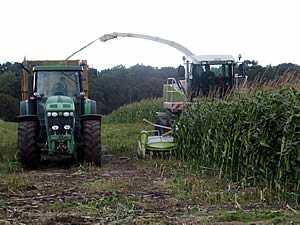24/10/06
Livestock farmers feeding forage maize this autumn should be wary
of an increased mycotoxins risk if crops were affected by the fungal
disease smut (Ustilago maydis) at any stage during the growing
season.
 |
So says Alltech UK’s ruminant technical manager David Wilde,
who warns that hot and dry summer conditions in many parts of the
country have created ideal conditions for smut and that drought-stressed
maize will have been more susceptible to this as well as other
plant diseases.
“Smut has been reported widely in forage maize this year
and is responsible for a lot of stunted crops,” he says, “but
a reduction in dry matter yield is only part of the problem.
“The disease pressure caused by smut will leave plants more
susceptible to moulds, and it is these that can produce the mycotoxins
that may present a hidden threat at feed out.
“Smut itself may cause diarrhoea in cows, so if it is known
to be in the silage it is vital to ensure plenty of effective fibre
is included in the ration to help with rumen function and mitigate
the effects. Mycotoxins, however, can be responsible for a wide
variety of symptoms including erratic production, reduced fertility,
general lethargy and swollen hocks.
“If farmers suspect a mycotoxins problem, they should immediately
withdraw or at least dilute the potentially contaminated feed and
at the same time consult their veterinary surgeon.”
Alltech UK has recently published a new booklet providing information
on the origins, effects and treatment of mycotoxins in ruminant
livestock. The guide provides a risk assessment section as well
as advice and case studies. Copies are freely available from Alltech
by calling 01780 764512.
 Fall In Scottish Cereals Output No Surprise Fall In Scottish Cereals Output No Surprise
 Crop Market Update Crop Market Update
 New Guide Highlights Mycotoxins Risk From Drier Grass Silage New Guide Highlights Mycotoxins Risk From Drier Grass Silage
|



